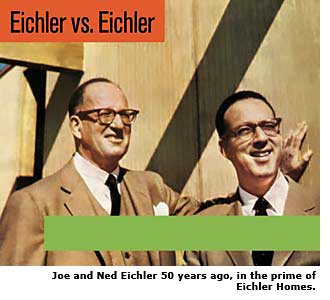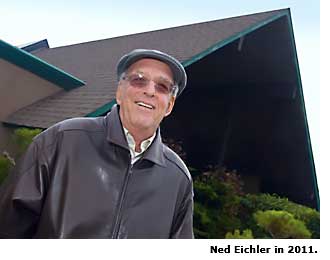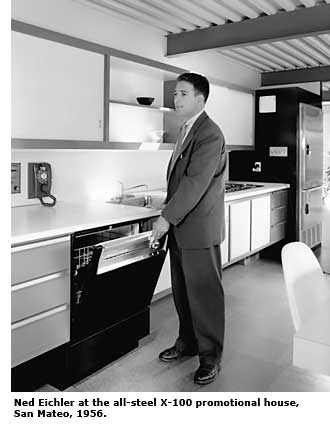Eichler vs. Eichler

In a different world, Edward 'Ned' Eichler would have studied history or literature, moved to Paris, and made a name for himself as a historian or creative writer. He would, perhaps, have become like his youthful literary heroes Graham Greene and Somerset Maugham, "someone who traveled around a lot, observed people, and wrote," Ned recalled in a recent interview.
Instead, he joined his father's firm, Eichler Homes, became a master of marketing and an expert in salvaging the assets of troubled companies; the president of Levitt and Sons, one of the few homebuilding companies more famous than the one founded by his father; and an innovator in the field of apartment house financing.
And for better or worse, Ned, looking back at 80, owes it all to his dad, Joe Eichler, a strong-willed, visionary builder who was committed to producing modern, architect-designed homes for the middle-class masses, a man whom Ned loved and respected, but one who never gave his son his due. Throughout their career together, Joe would parcel out authority to his son—and then haul it back in whenever Ned tried to use it.
It didn't help that Ned, who focused on the fundamentals of business far more than his free-wheeling father ever did, argued against many of Joe's strategies.
"I had terrific running arguments with my father," Ned said. "A classic father-son dispute. It was egos, all kinds of stuff. Tremendous fights."
It also didn't help that, as his later career showed, Ned was very much a take-charge guy—smart, decisive, calm, and analytical but never afraid to speak his mind. He was "a guy who likes to get things done," according to his friend and former colleague John Koskinen. And, according to former colleague Jay Krinsky, "Ned got frustrated easily when he felt he could do a better job than somebody else," that "somebody else" often being his boss.

"His mind was so fast," Krinsky said, "that you either learned how to deal with that or you couldn't be with him."
The story of Joe and Ned, who came together, competed for power, and split apart several times during Joe's career as a homebuilder, reveals a lot about how the company was run, why it succeeded—and why it failed.
Ned first worked for Eichler Homes driving trucks during summers as a college student in 1949. In 1951 and 1952, after college, he returned to handle purchasing. After an army stint, Ned returned again in 1954, staying with the company through 1963. He stepped back in briefly in 1966, after Joe suffered a heart attack and the firm teetered on bankruptcy. Ned was not associated with his father's later homebuilding ventures J.L. Eichler Associates, Nonpareil Homes, or Alsco Homes.
From early on, Ned realized how he was different than his father. "I'm an intellectual. I'm interested in ideas and why people do what they do. That's my definition of an intellectual," he said. "Few architects or builders, including my father, are intellectuals."

The conflict between father and son makes clear, for example, that the Eichler venture was never solely about earning profits, but about promoting modern housing and social justice as well. "You're never going to understand my father," Ned told another homebuilder, explaining why Joe was willing to sell houses to black people when no other builders would. "Your whole interest is making the maximum amount of money. That is not his whole interest."
"Essentially," Ned said of his father, "his commitment was to prove that he could build [modern houses] and sell them to people where they didn't have to pay a premium against conventional houses, which everybody said you couldn't do."
The conflict is also, of course, a very human story about a son who tried all his life to win his father's love—and it is a story that Ned Eichler, a soft-spoken, garrulous man, is not afraid to tell. Ned compares the tale to Robert Anderson's play, 'I Never Sang for my Father,' "about a father who never tended to the interests and feelings of the son."
Joe never looked at his son's report cards, never discussed books with him—though Ned would read the books that Joe had just finished. He never took Ned to see the San Francisco Seals play baseball. Instead, he took Ned along on his golf outings with his own buddies. So Ned took up golf—and mastered it.
"He saw the world as a reflection of himself," Ned said of his father.
That said, Ned remains an admirer of his father, praising him for his integrity, the efficient way he organized and ran construction, his lack of class-consciousness, and for his charisma.




